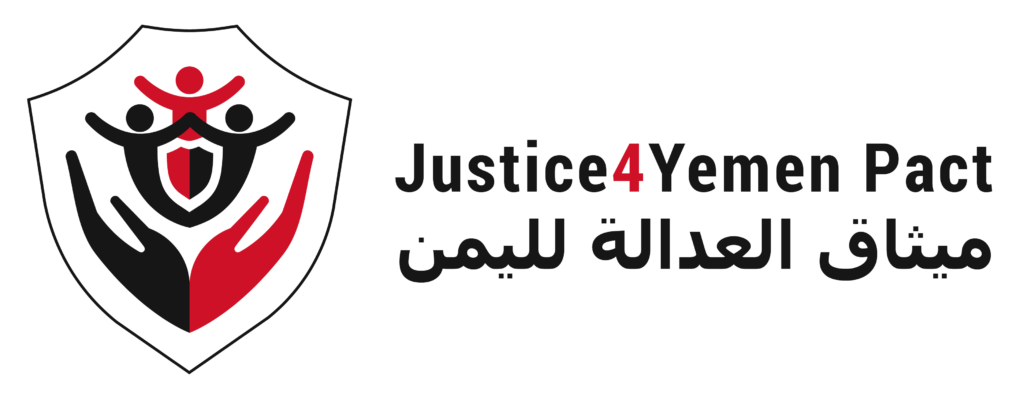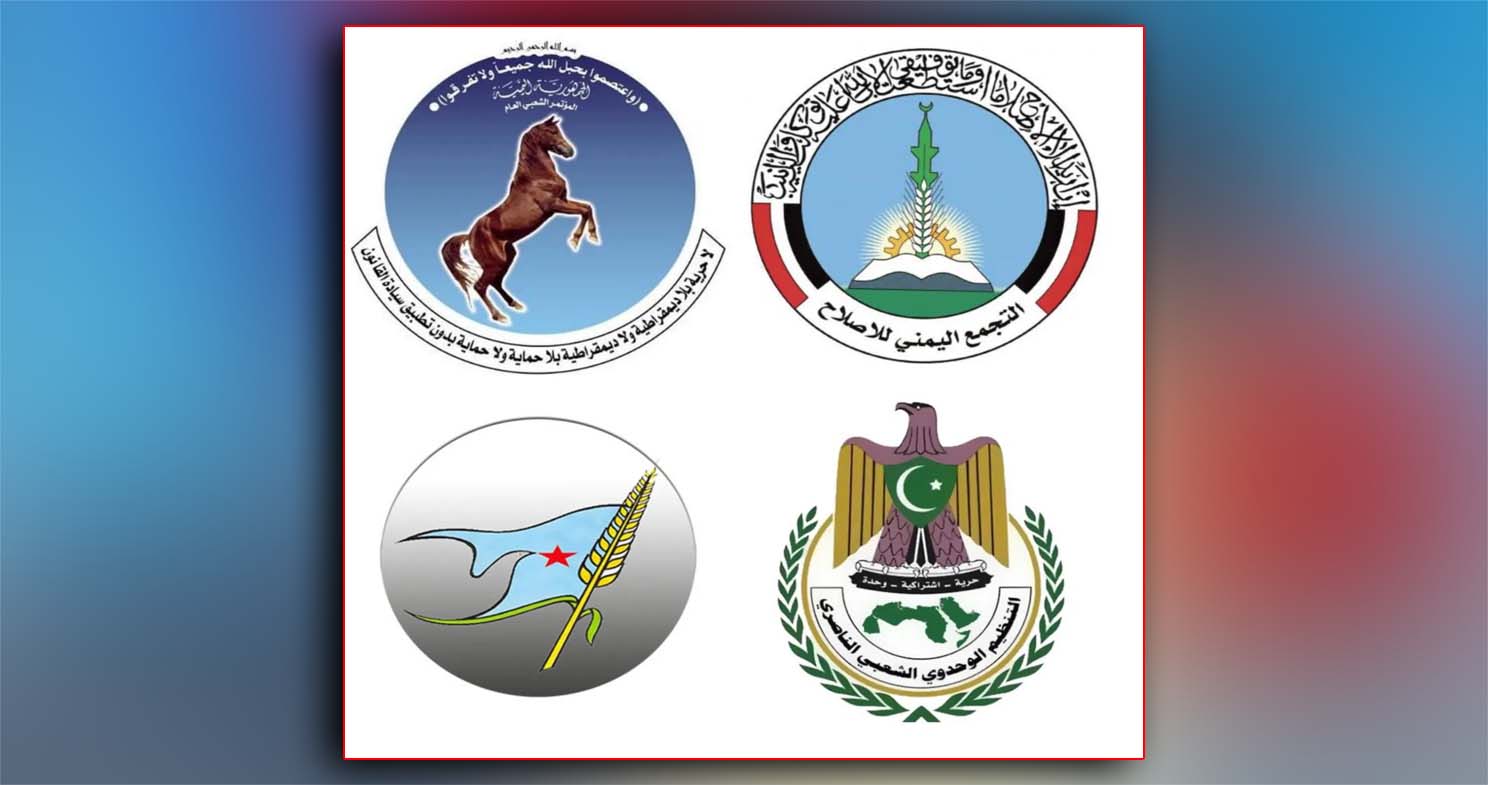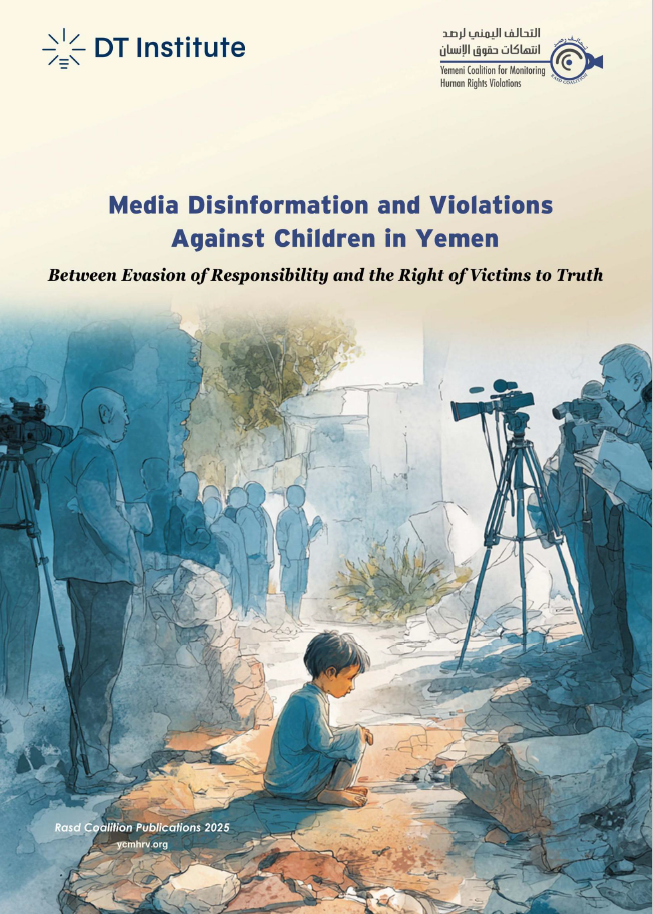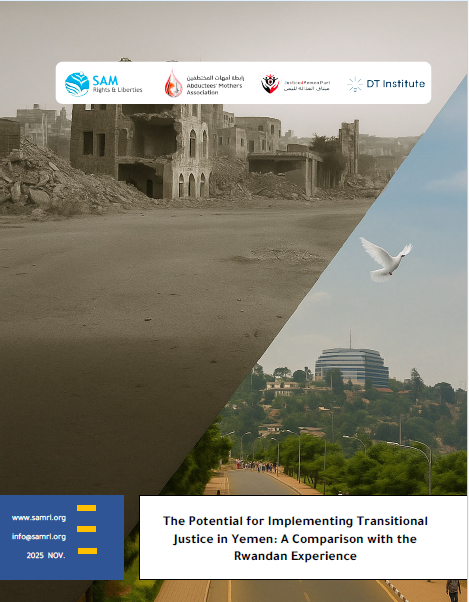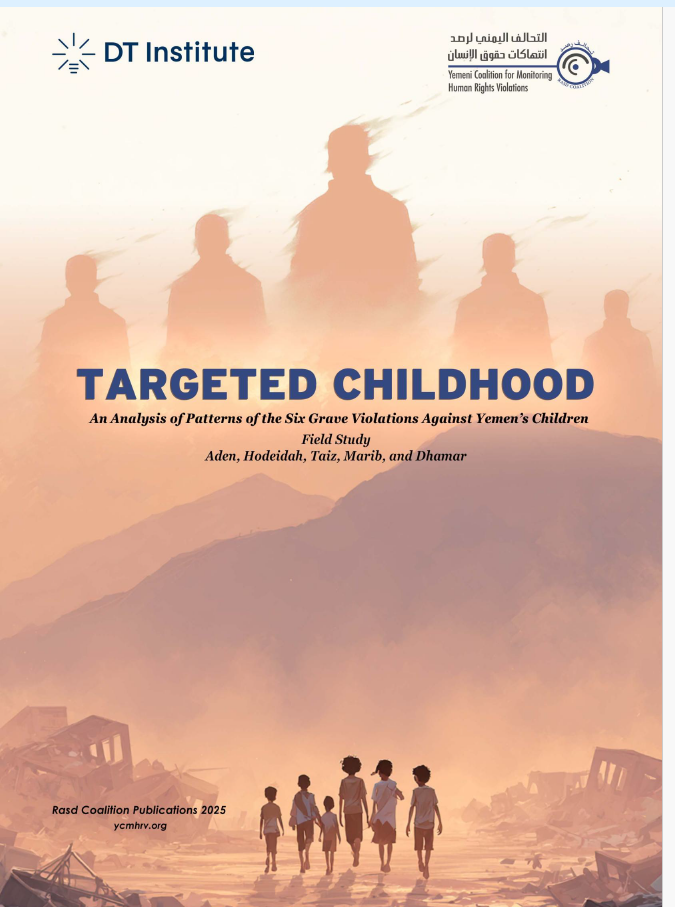Overview of the SPARK Program
In June 2025, five members of the Justice4Yemen Pact (J4YP), a coalition of 10 Yemeni civil society organizations, joined the SPARK team, composed of DT Institute and its local partners, the Abductees’ Mothers Association (AMA) and SAM for Rights and Liberties (“SAM”), to launch advocacy campaigns to complement and expand the geographic scope of restorative justice pilots and raising awareness initiatives in Taiz .
The pilots aim to foster reconciliation and resolve community-level public disputes that have caused human rights violations. While the advocacy campaigns focus on raising community awareness of transitional justice – its mechanisms, opportunities for engagement, and importance for sustainable peace in Yemen – enabling replication of reconciliation mechanisms and community involvement in national transitional justice processes.
This model was designed in response to the findings of The Path Towards Peace, a research study published by SPARK in April 2025. This study captured local understandings of transitional justice (TJ) across Yemen, revealing that 64.3 percent of community members prioritize reconciliation and war-ending efforts over retributive accountability. Moreover, it further revealed that 51 percent of the research sample had no knowledge of transitional justice at all – identifying a crucial need for education. Participants identified clear roles for civil society: initiating dialogue and reconciliation, offering legal and financial aid to victims, raising TJ awareness, and documenting violations.
To address these gaps, SPARK works to strengthen locally owned mechanisms of reconciliation that respond to community demands for peace over retribution. At the same time, the program builds resilience within divided communities, creating sustainable pathways for dialogue and conflict resolution. Through inclusive approaches, such as victim-centered advocacy campaigns and innovative cultural initiatives, like music for reconciliation, SPARK ensures that women, youth, and marginalized groups are not only participants, but central drivers of Yemen’s transitional justice journey. With donor support, these efforts can be scaled to reach more communities, ensuring that reconciliation and peace take root from the group up.
Initiative Spotlight: Voices of Change
SPARK’s focus on community- and victim-led transitional justice is crucial. Victims and their broader communities – also victimized by the ongoing conflict – are the best sources on violations and harm inflicted by them. Moreover, victims provide crucial insights into the long and short-term effects of violations and their individual and collective needs going forward. Addressing these serious concerns is an imperative aspect of transitional justice and the only way such processes can foster sustainable change and peacebuilding.
Civil society, political parties, and governmental actors, including local authorities and judicial and security agencies, must also be considered. Their cooperation and involvement is required for whole-of-society, national processes. Moreover, their agreement on critical issues – such as, which year or date to set as the starting point for Yemeni transitional justice processes to consider in addressing Yemen’s long history of human rights violations – is also necessary.
The Study: Perspectives of Political Parties and Civil Society Organizations on Transitional Justice in the Yemeni Context
Under the Voices of Change Initiative, J4YP partner, The Free Media Center for Investigative Journalism (“Free Media”), sought to understand and illustrate the voices and perspectives civil society, political parties, and victims. In doing so, they engaged in comprehensive research culminating in the publication of a study
The study brought together these voices and perspectives to explore one of Yemen’s most pressing questions: How can justice pave the way for peace? It emphasized Yemeni transitional justice as victim-centered, requiring key actors – civil society and political parties – to consider actionable frameworks to sustainably address the grievances of victims of the past and present.
The study drew upon 20 in-depth interviews performed across five governorates (Taiz, Sana’a, Aden, Marib, and Al Hudaydah). Interviews were conducted with 20 stakeholders, including four political parties via closed-door sessions, 10 civil society actors, and six human rights victims.
The paper reflected each of their perspectives, capturing the hopes, challenges, and competing visions that shape Yemen’s transitional justice journey. Accordingly, it also reveals a shared recognition and visions. This recognition holds that lasting peace must be built not only on political settlements, but also on truth, accountability, and dignity for victims.
💬 “We realized that we are not just observers but can be a link between parties and victims, helping to build trust between the conflicting parties.” – Mahfouz Abdulrahman, director of a local human rights organization, who participated in the interviews.
Key Impacts
This study was the first of its kind in reflecting the perspectives of political parties on transitional justice. Political parties consulted included the Nasserist Union People’s Organization (NUPO), the Yemeni Reform Assembly Party (Islah), the Yemeni Socialist Party (Eshtraki), and the General People’s Congress Party (GPC). Transitional justice is considered a sensitive topic for discussion with Yemeni political entities. Many of these parties have participated as both perpetrators and victims throughout Yemeni history, leading to a fear of accountability when discussing transitional justice.
The paper helped not only to bridge understanding, but in encouraging and fostering political parties to reconsider transitional justice as a tool for sustaining peace.
In reflecting on perspectives for the future, the paper focused on practical considerations and effective next steps to be undertaken by Yemeni stakeholders.
For instance, in closed-door sessions with political parties, SPARK interviewers pushed political parties to consider past violations in proposing a starting date for Yemen’s transitional justice process. While some political parties were hesitant to delve into the past, they later acknowledged it was a necessary – although difficult – step in working towards whole-of-society transitional justice in Yemen.
💬 “I never imagined we could discuss transitional justice with such clarity. This session has made me realize that addressing the past is not a threat to the present, but rather a necessary step toward building a more stable future.” – Abdelwahab Moawada, Parliamentarian and Leader in the GPC party, on his change of heart in addressing past atrocities as the closed-door session progressed.
Moreover, the paper involved victim’s perspectives and lived experienced in the consideration of next steps for transitional justice as necessary for effective peacebuilding. This not only contributed to a shared national vision on transitional justice, which the paper strived to embody, but also to victims’ sense of recognition.
One female victim stated, “I lost my husband and my son in the conflict. No one has ever asked me what I went through before.” She emphasized the positive impact of just sharing their story with SPARK interviewers. She continued, “this interview made me feel that my voice matters, and that my suffering will not be forgotten.”
By capturing, comparing, and analyzing the diverse perspectives of Yemeni society, civil society, and political parties, the paper put forth actionable recommendations for the realization of transitional justice. Specific recommendations provided donors and funding partners, the international community, the internationally recognized government of Yemen (IRG), political parties, civil society organizations, and even victims, were also put forth.
Each of the individual recommendations provided complemented the others, leading to comprehensive systems of change and peacebuilding.
Together, the recommendations worked to create a practical, inclusive, and context-specific framework for advancing transitional justice in Yemen, while also ensuring that victims’ rights, accountability, and institutional reform remain central to the process.
These included supporting the creation of independent coalitions and platforms for victims, enabling them to express their demands and actively participate in the design and implementation of transitional justice mechanisms. The study also recommended the IRG and political parties adopt a victim-centered approach in all government plans and policies by building direct communication channels with victims to understand their needs and expectations.
Donors, funding partners, and the international community were encouraged to support this coordination. The recommendations called for them to provide technical and financial support to build the capacity of Yemeni civil society so that they can better support victims.
💬 “With one voice, we stand for transitional justice and for the battle to rid the country of militias.” – Sami Al-Hamidi, local journalist and victim-participant in CSWC’s Transitional Justice Through the Eyes of Victims Showcase
Study Results Already in Action
As a result of the study, several prominent stakeholders, including the Ambassador of The Netherlands to Yemen, the Vice-Chair of the Consultation and Reconciliation Commission (CRC) of the Presidential Leadership Council (PLC), and the Secretary-General of the NUPO, reached out to further discuss the findings. The Ambassador of the Netherlands and Vice-Chair of the CRC engaged together, in the presence of Free Media, to explore ways to implement the recommendations put forth in the paper.
By the end of the meeting, the Ambassador requested Free Media submit a project proposal to actualize the recommendations provided by the study. The parties also agreed to continue coordination amongst themselves to support the national transitional justice process with the potential to conduct further joint activities.
In their meeting with the Secretary-General of the NUPO, the Secretary-General reaffirmed the party’s unwavering support for human rights and national transitional justice processes as necessary measures to restore the state and build trust among political forces. He also stressed the importance of utilizing the study as a launching point to initiative broader national dialogue on the rampant human rights violations throughout the country. In doing so, he emphasized the NUPO’s readiness to actively participate in any national processes aimed at achieving peace, redressing grievances, and ensuring non-recurrence.
Learning, Documentation, and Replication
The paper was published via the J4YP’s and Free Media’s websites and announced via Free Media’s Facebook in both English and Arabic. Facebook announcements generated reach of over 94,668 and engagement from over 4,495 online users. It was additionally shared with prominent stakeholders, including the Office of the Special Envoy of the Secretary-General for Yemen (OSESGY) and the European Union (EU), among others.
To boost awareness of the paper’s publication, Free Media also published engaging content and visual materials on social media, including posters and interviewee quotes. The visual materials provided insights into the closed sessions and key findings.
These included four posts, each dedicated to the perspectives of the political parties interviewed – the NUPO, Islah, Eshtraki, and GPC parties. Additional published materials, highlighting key findings and providing quotes from those consulted, were also circulated. These materials streamlined the findings of the study into easily understandable and quickly absorbable format.
💬 “For the first time, I understand the meaning of transitional justice in a simple and easy way. This is for us, the next generation.” – Rashid Mohammed, a 30-year-old transitional justice specialist, in his comment on Free Media’s social media materials summarizing the report findings.
Moreover, Free Media also drafted and published short papers, summarizing each of the closed-door sessions with the NUPO, Islah, Eshtraki, and GPC parties. Free Media also held a workshop, bringing together 13 attendees, including transitional justice experts, representatives from the NUPO, Islah, Eshtraki, GPC, and the Union of Popular Forces (UPF) parties, victims, journalists, OSESGY, and civil society organizations.
The workshop focused on building a shared initial political narrative on transitional justice among the parties involves in Yemen’s political process. Attendees discussed topics such as which transitional justice models are suitable for Yemen and the role of transitional justice in future peace and political processes. By the end of the session, participants summarized key recommendations in a report to be built off in continued future coordination.
5. Scaling the Impact
The urgent need for transitional justice in Yemen is clear. Moreover, after over a decade of failed national peace talks in which victim and community needs were disregarded, the urgent need for victim- and community-led transitional justice is even more clear. The role of civil society and the goal of the SPARK program is to foster and provide the necessary skills, tools, and knowledge required by local communities to lead such transitional justice processes as part of Yemen’s national peacebuilding.
“In Yemen, building lasting peace requires engaging key political actors and post-war powerholders in open dialogue,” explained DT Institute Program Assistant, Sahar Mohammed. “Civil society must act as a neutral bridge — creating communication channels, fostering understanding, and removing obstacles — to ensure a transitional justice process that learns from past failed reconciliations and prevents the cycle of conflict from repeating.”
By raising awareness of transitional justice and engaging all transitional justice stakeholders, advocacy campaigns foster community responsibility to operationalize transitional justice principles. They envision transitional justice efforts, rooted in local ownership, dignity, and dialogue, serving as foundations for broader restorative justice pilots and raising awareness initiatives.
Free Media’s advocacy brought together transitional justice stakeholders to look at Yemen’s past and present atrocities and propose actionable recommendations on the path forward. This represents an initial step – one of many – that must be undertaken to expand Yemeni society’s understanding and ability to engage in effective transitional justice processes.
Yet the scale of the challenge far exceeds current resources. With greater donor investment, SPARK could expand restorative justice pilots to additional governorates, reaching thousands more Yemenis with awareness campaigns and victim-centered initiatives and strengthening the capacity of civil society to engage directly in national dialogues on reconciliation.
It would also allow the SPARK team to replicate Free Media’s innovative approach, broadening the scope. This would enable engagement of additional stakeholders, including government institutions, the judiciary, and other political parties, in confronting realities and building towards transitional justice. Moreover, SPARK could expand pilots and campaigns to also actualize and complement victims’ transitional justice recommendations as provided by Free Media’s study.
These include launching of legal awareness programs to increase victims’ knowledge of core transitional justice mechanisms and concepts and initiating systematic consultations with stakeholders to expand acceptance of independent technical assessments. This is a unique opportunity for donors to invest in scalable, locally led solutions that bridge the gap between grassroots reconciliation and national peacebuilding.

